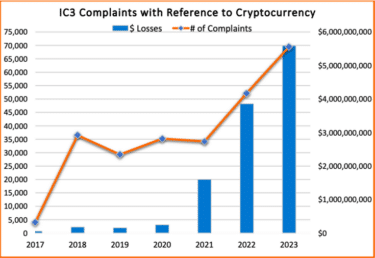Crypto Ponzi Schemes on the Rise
The rise in popularity of cryptocurrency has created fertile ground for fraud, including Ponzi schemes. Crypto Ponzi schemes function similarly to traditional Ponzi schemes by misleading investors into believing their returns are generated from legitimate trading or business activities. In reality, the fraudulent cryptocurrency companies use new investor funds to pay earlier investors, eventually leading to collapse when recruitment slows.
The SEC remains committed to rooting out these crypto frauds. On February 21, 2025, SEC Commissioner Hester M. Peirce stated:
[T]he Commission’s efforts continue unabated to combat fraud involving securities, including crypto assets that are securities or that were offered and sold as part of an investment contract, and tokenized securities. The Commission welcomes the public’s tips about securities violations.
And, indeed, whistleblower tips are needed to combat the rising number of crypto schemes. According to the FBI’s 2023 Cryptocurrency Fraud Report, crypto frauds account for a majority of losses due to financial fraud:
In 2023, the Federal Bureau of Investigation (FBI) Internet Crime Complaint Center (IC3) received more than 69,000 complaints from the public regarding financial fraud involving the use of cryptocurrency, such as bitcoin, ether, or tether. Estimated losses with a nexus to cryptocurrency totaled more than $5.6 billion. While the number of cryptocurrency-related complaints represents only about 10 percent of the total number of financial fraud complaints, the losses associated with these complaints account for almost 50 percent of the total losses.
The FBI’s report also highlights the significant increase in losses due to crypto frauds since 2021:
Under the SEC Whistleblower Program, whistleblowers can submit tips anonymously to the SEC through an attorney and be eligible for an award for exposing any material violation of the federal securities laws, including crypto Ponzi schemes and scams. Since 2011, whistleblower tips have enabled the SEC to bring enforcement actions resulting in more than $6 billion in monetary sanctions and the SEC has issued more than $2.2 billion in awards to whistleblowers. The largest SEC whistleblower awards to date are $279 million (May 5, 2023), $114 million (Oct. 22, 2020), and $110 million (Sept. 15, 2021).
This article discusses: 1) how to identify a crypto Ponzi scheme; 2) the SEC Whistleblower Program; 3) how to report a crypto Ponzi scheme and earn an SEC whistleblower award; and 4) examples of recent SEC enforcement actions against crypto Ponzi schemes and scams.
How to Identify a Crypto Ponzi Scheme
The SEC and FBI have warned investors about common red flags associated with Ponzi schemes, including crypto Ponzi schemes, such as:
- High returns with little or no risk: Claims of consistent, substantial profits is a hallmark of Ponzi schemes. Every investment carries some degree of risk and investors should be suspicious of any “guaranteed” investment opportunity.
- Complex or secretive investment strategies: Fraudsters often claim proprietary or undisclosed trading algorithms that cannot be independently verified.
- Difficulty withdrawing funds: Investors may experience delays or be encouraged to “roll over” their investment for even higher returns. Additionally, some crypto frauds require investors to pay “fees” prior to withdrawing their (fake) profits.
- Heavy recruitment incentives: Some schemes require investors to recruit new members to receive payouts, resembling pyramid structures.
- Anonymous or unlicensed promoters: Many crypto frauds are run by unknown entities or individuals with no verifiable credentials.
- Domain or website names that impersonate legitimate crypto companies and exchanges: Many crypto Ponzi schemes would be halted in their tracks if investors conducted research on their domain names, which would reveal that the websites are fake and/or were created recently to resemble a successful cryptocurrency company or exchange. Investors can use resources, such as Wayback Machine or Whois lookup, to research domains and determine, at a minimum, when a website was created.
If an investment opportunity sounds too good to be true, it likely is.
SEC Whistleblower Program
Under the SEC Whistleblower Program, the SEC will issue awards to whistleblowers who provide original information, including information about Ponzi schemes, that leads to successful enforcement actions with total monetary sanctions in excess of $1 million. A whistleblower may receive an award of between 10% and 30% of the total monetary sanctions collected. If represented by counsel, a whistleblower may submit a tip anonymously to the SEC.
In its short history, the SEC Whistleblower Program has had a tremendous impact on securities enforcement and has been replicated by other domestic and foreign regulators. Since 2011, the SEC has received an increasing number of whistleblower tips in nearly every fiscal year. In FY 2024, the SEC received approximately 24,980 whistleblower tips and awarded over $225 million to whistleblowers.
How to Report a Crypto Ponzi Scheme
To report a Ponzi scheme and qualify for an award under the SEC Whistleblower Program, the SEC requires that whistleblowers or their attorneys report the tip online through the SEC’s Tip, Complaint or Referral Portal or mail/fax a Form TCR to the SEC Office of the Whistleblower. Prior to submitting a tip, whistleblowers should consult with an experienced whistleblower attorney and review the SEC whistleblower rules to, among other things, understand eligibility rules and consider the factors that can significantly increase or decrease the size of a future whistleblower award.
SEC Targets Crypto Ponzi Schemes
The SEC has aggressively pursued crypto-related fraud, including crypto Ponzi schemes and other fraudulent investment scams. Below are some examples of recent crypto-related frauds that were halted by the SEC. Notable cases include:
- In August 2024, the SEC filed a lawsuit against NovaTech and its promoters, alleging they operated a fraudulent crypto pyramid scheme that raised around $650 million from over 200,000 investors worldwide. According to the SEC’s complaint, the defendants operated NovaTech as a multi-level marketing (MLM) and crypto asset investment program from 2019 through 2023. They lured investors by claiming NovaTech would invest their funds on crypto asset and foreign exchange markets. In reality, NovaTech used the majority of investor funds to make payments to existing investors and to pay commissions to promoters, using only a fraction of investor funds for trading. The complaint further alleges that the Petions siphoned millions of dollars of investor assets for themselves.
- In August 2024, the SEC obtained emergency asset freezes against brothers Jonathan and Tanner Adam for allegedly conducting a $60 million Ponzi scheme affecting more than 80 investors across the U.S. According to the SEC’s complaint, the brothers promised up to 13.5% monthly returns, claiming the funds would be used in a crypto asset trading platform. Instead, they used new investor funds to pay earlier investors and for personal expenses, including luxury items and real estate.
- In November 2022, the SEC charged Douver Torres Braga, Joff Paradise, Keleionalani Akana Taylor, and Jonathan Tetreault for their roles in Trade Coin Club, a fraudulent crypto Ponzi scheme that raised more than 82,000 bitcoin, valued at $295 million at the time, from more than 100,000 investors worldwide. According to the SEC’s complaint, Braga created and controlled Trade Coin Club, a MLM program that operated from 2016 through 2018 and promised profits from the trading activities of a purported crypto asset trading bot. The SEC also alleged that Trade Coin Club operated as a Ponzi scheme and that investor withdrawals came entirely from deposits made by investors, not from any crypto asset trading activity by a bot or otherwise.
- In August 2022, the SEC charged 11 individuals for their roles in creating and promoting Forsage, a fraudulent crypto pyramid and Ponzi scheme that raised more than $300 million from retail investors worldwide. According to the SEC’s complaint, Forsage allowed millions of retail investors to enter into transactions via smart contracts that operated on the Ethereum, Tron, and Binance blockchains. Forsage allegedly operated as a pyramid scheme for more than two years, in which investors earned profits by recruiting others into the scheme. Forsage also allegedly used assets from new investors to pay earlier investors in a typical Ponzi structure.
As crypto-related fraud continues to evolve, the SEC relies on whistleblowers to expose these scams and protect investors. See the SEC’s Investor Alert: Watch Out for Fraudulent Digital Asset and “Crypto” Trading Websites.
SEC Whistleblower Attorneys
If you would like more information on reporting a violation of the federal securities laws, contact an SEC Whistleblower Attorney at Zuckerman Law for a free, confidential consultation. Zuckerman Law is one of the nation’s leading law firms representing whistleblowers in whistleblower rewards and retaliation cases.






Crypto Ponzi Scheme SEC Whistleblower Lawyers
How to Qualify for an SEC Whistleblower Bounty
- See our column in Forbes: One Billion Reasons Why The SEC Whistleblower-Reward Program Is Effective.
- See our column in Going Concern: Sarbanes-Oxley 15 Years Later: Accountants Need to Speak Up Now More Than Ever.
- See our post in Accounting Today: Whistleblower Protections and Incentives for Auditors and Accountants.
- See our post in The Compliance and Ethics Blog: Shkreli Trial Reveals the Challenges Faced by Compliance Whistleblowers.
SEC Whistleblower Process
Crypto Ponzi Scheme SEC Whistleblower Awards
Are Whistleblowers Protected from Retaliation?
Click here to learn more about anti-retaliation protections for SEC whistleblowers under the Dodd-Frank Act and Sarbanes-Oxley Act.




